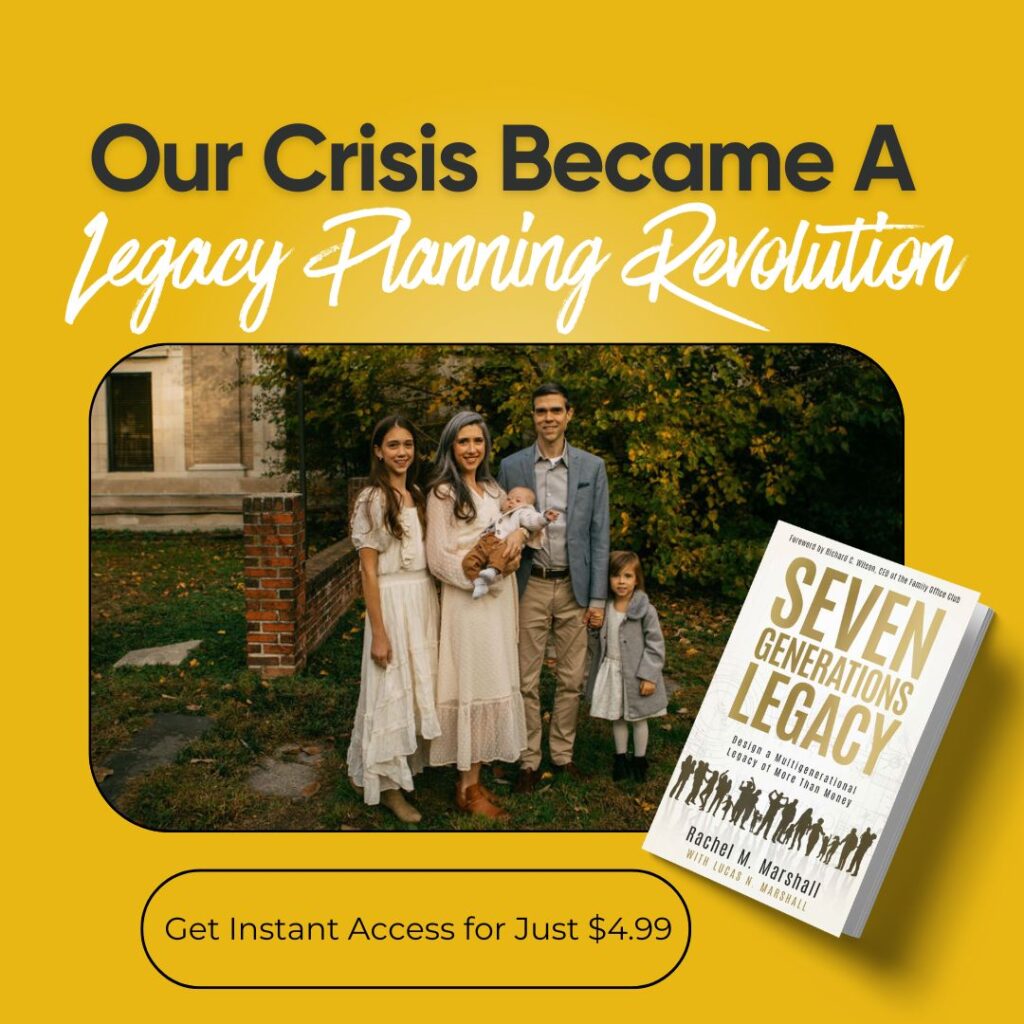
Secrets to a Strong Family Culture, with Jeremy Pryor
Culture matters in the corporate world. It drives profitability and retention, reduces turnover, and leads to higher job satisfaction. But the family is an arena where the stakes are even higher. Without a strong family culture, all your plans, strategy, and even your legacy will fall apart.
That’s why it’s time to dedicate yourself to building and living the family culture today. But what can you do to redeem your family and infuse your everyday life with meaningful connections?
Jeremy Pryor, Partner and Co-Founder of Family Teams is helping families build a multigenerational team on mission.
Today, we’re having Jeremy back to talk about the definition of family, why you want to build and keep improving your family culture, and the practical steps you can take now to lay the foundation for children who opt into your multigenerational family team.
If you’re looking for practical tools to strengthen your family culture today, so you have more connection, stronger bonds, more time together, and kids who choose to stay committed even after they grow up… tune in now!
Podcast: Play in new window | Download (Duration: 1:01:08 — 70.0MB)
Subscribe: Apple Podcasts | Spotify | Android | Pandora | RSS | More
Table of contents
What is Strong Family Culture, and Why Does it Matter?
[4:06] “When you’re starting a family, this is one of the great privileges that you get to design the kind of family that you want to have.”
When you are developing a company, you have the power to develop the mission and culture of that company. You do this by identifying the goals of the business, as well as a way of “being” within the company. And just like you can formulate this cohesive work team, you can also form a cohesive family team.
It starts with your relationship with your spouse. By identifying your shared values and beliefs, and how you wish to exist in your household, you lay the foundation for your family culture.
[5:05] “It’s a wonderful experience to grow up in a household, as a child, that has a particular culture that brings the family together. And it can be based on things that you really feel called to, that you really enjoy. There’s not a blueprint for family that is so rigid that you can’t bring a lot of distinctives into the family, and make it something that’s truly unique.”
The Importance of Family
[7:10] “I come at this as somebody who was very confused about the topic of family; not very excited, it just didn’t seem like something that…really was working well. I grew up in the Seattle area. There was just a lot of divorce, and I just noticed a lot of brokenness.”
Family wasn’t something Jeremy believed he could choose to build. His experience with family units as a kid was less-than-ideal. This made him believe that you either lucked out or you didn’t. But over time he learned that there were families with an incredibly deep and intricate root system. The multi-generational families he met had a strong sense of identity and culture, and they supported one another. Their systems don’t implode when the kids grow up and have their own kids.
Team Pryor’s work is all about proving that family culture can be cultivated by calling in your family members to be a part of something bigger. This helps family members find a sense of pride and belonging within the family unit, as well as a purpose. A family with strengthened bonds can work together for the good of all involved, and foster a system of support.
What Are the Components of a Strong Family Culture?
[12:48] “One of the most basic ways to think about culture [is] the repeated actions that are distinctive to that group.”
Oftentimes, companies come up with “aspirational values,” or things that they wish were true about their company. They may talk up those values to employees, or put them on the wall somewhere, but they have very little impact on how the company actually behaves.
[13:13] “To me, there has to be a way to translate those values into repeated action. And we have two massively powerful templates given to us by God in Genesis 1 for crafting repeated action, and they are the week and the year. There’s also the month, but those are the two most powerful. So we very carefully cultivate our weekly rhythm as a family around our values, and we also carefully curate our annual rhythm around the things that we value.”
Creating a family culture depends on what you celebrate and do within your own family. If you want something to be a part of your family culture, you have to “craft” it into your family rhythm. For example, if you have a desire for your family to be artistic and appreciative of the arts, you incorporate that into your weekly and annual rhythm. That may include setting aside time each week for crafts and projects, taking trips to museums or exhibits, and fostering conversations about art at meal times. You could apply this to anything: entrepreneurship, music, literature, and more.
Challenges for Modern Families
[15:20] “I think what’s really tough for modern families is that they expect that their children will have–and their family’s rhythm will be purely designed around–other people deciding what those things for them.”
As your children grow up, they have so many outside influences that have opinions and influences on your children’s lives. Coaches, teachers, youth leaders, and so many other influences are involved in the lives of your children. It can feel like you’re battling these outside voices on what your family culture is and will be.
In fact, more than ever, it seems like kids are becoming better and better at forming outside social relationships, and worse at forming strong generational bonds. And while you may live in a social environment with peers your age while you’re in school, life after high school or college is very multi-generational. In church, at work, and within families, you must navigate relationships with people older than you and younger than you, and many people don’t know how to do this effectively.
Being Intentional with Your Family
One reason it’s so important for Team Pryor to craft their family culture is because of intention. So much of the “default” family model is just that—default. And when Jeremy and his wife were starting their family, it was important to them to examine why they were going to do certain things or not. That way they could control and cultivate, to a degree, what their family would be.
Without that intention, what you get will probably be the “default,” whether you like that family model or not. So bringing intention into the picture allows you to be on the same page and work toward a family vision that brings you a sense of joy and pride.
Jeremy says he is a highly individualistic person. Yet, he understands that despite that being his personal identity, he also has a family identity to live up to, and that factors into how he shows up for his family.
[23:30] “For me, it is a daily decision, and especially in that weekly meal, to say I want to be a father at this table. So what I tell people when we get to a table is [that] we’re going to experience our family-ness. Everyone at this table is their family identity. We don’t have anywhere better to go. It’s Friday night, we have nothing else planned, we can stay up late. We’re going to eat a great meal, we’re going to hang out together, and I’m going to be a father.”
Negative Family Experiences
Negative experiences will inevitably happen. All relationships can have disagreements, hurt feelings, and more. Yet within family structures, many people choose to alienate themselves from family altogether, rather than heal those relationships.
[25:25] “A lot of the identity conversations that are being had in our culture are from wounded people who are understandably very badly hurt because these family identities have not gone well for them. And so they are seeking other, alternative identities… And they’re trying to figure out, would society be better if everyone existed with much more atomistic, individual identities versus family identities? Again, that’s a very open conversation, let’s have that conversation, and I’m operating from a set of axioms that say that the family identities are actually better at leading to human flourishing, and what we need to heal family identities… If you’ve had very negative experiences in these areas, the answer is not less family or not healthy family, but it’s actually to learn how to build a healthy family; to be equipped to build healthy family identity.”
Important Elements of a Thriving Strong Family Culture
If you want to know what a thriving family culture looks like, Jeremy outlines a few keys to success.
- Repeated activities or habits (weekly, monthly, and annual rhythms)
- Gathering and sharing family stories
- Canonical stories associated with your family values
- Use of physical space to reflect family values. How does your physical space reinforce what your family finds important?
- Annual family summits to call children into the family culture and influence the family’s direction
- Discussing family assets and how they serve the whole family unit
- Supporting the individual callings of family members
Ultimately, Jeremy shares, the secret to creating a strong sense of family is to make sure that each member of the family feels like they belong together more than anywhere else. This includes looking out for the member of the family that feels the least sense of belonging and helping them feel fully known and fully loved.
[56:48] “Belonging is about being fully known and fully loved at the same time. So to really know the members of your family—within all their weaknesses, all their struggles—and to communicate to them that they are fully loved here and they always will be. That’s really the bedrock of belonging that creates culture.”
Connect with Jeremy
- Family Revision
- jp@teampryor.com
- 1-859-630-4338
- FamilyTeams.com
About Jeremy Pryor
Jeremy met his wife April in Jerusalem in 1997 when they were students. They’ve spent the last 20 years building Team Pryor together. They have five kids: Kelsey, Jackson, Sydney, Elisa, and Kaira. They live in a multigenerational house with Jeremy’s parents and April’s mom in Fort Thomas, KY just a few miles from Cincinnati, Ohio. They’ve founded and led several businesses and non-profits including Epipheo (a video production agency), Just Sew (a quilt shop), FamilyTeams.com (training content for families), 1000 Houses (a network of Cincinnati disciple-making households), and The Story-Formed Life (a discipleship training resource). For fun, the Pryors study Hebrew, take groups to Israel (join us), enjoy deep conversation over great food, and read Tolkien by firelight.
Book A Strategy Call
Do you want to coordinate your finances so that everything works together to improve your life today, accelerate time and money freedom, and leave the greatest legacy? We can help! Book an Introductory Call with our team today at https://themoneyadvantage.com/calendar/ and find out how Privatized Banking, alternative investments, or cash flow strategies can help you accomplish your goals better and faster. That being said, if you want to find out more about how Privatized Banking gives you the most safety, liquidity, and growth… plus boosts your investment returns, and guarantees a legacy, go to https://privatizedbankingsecrets.com/freeguide to learn more.
The Power of Trusts for Generational Wealth with Joel Nagel
If you’re reading this, chances are you’ve already taken the first step towards securing your financial future. But what about the financial futures of your children, grandchildren, or even your great-grandchildren? The journey towards financial stability isn’t a one-generation game; it’s about creating a lasting legacy that will provide for your loved ones long after…
Read MoreEstate Planning 101: Protecting Your Loved Ones
Can you confidently say your family’s financial future is protected? Staring down the barrel of a life-altering moment, I was forced to confront the fragility of existence and the critical importance of having one’s affairs in order. That harrowing experience became a catalyst for today’s soul-searching episode of the Money Advantage podcast, where we navigate…
Read More



